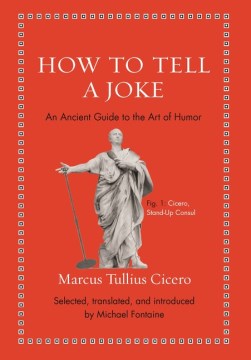
How to Tell a Joke
Publisher,Princeton Univ Pr
Publication Date,
Format, Hardcover
Weight, 362.87 g
No. of Pages, 292
Everyone knows that Marcus Tullius Cicero was one of the great statesmen, lawyers, and effective orators in the history of Rome. But did you also know he was regarded as one of the funniest people in Roman society as well? Five hundred years after his death, in the twilight of antiquity, the writer Macrobius ranks him alongside the comic playwright Plautus as the one of the two greatest wits ever. In this book, classicist Michael Fontaine, proposes to translate selections from Cicero's great rhetorical treatise, On the Ideal Orator (De Oratore). That larger work covered the whole of rhetoric and effective public speaking and debate. However, contained within it, is a long section focused on the effective use of humor in public speaking. In it, Cicero isconcerned not just with various kinds of individual jokes, but with jokes that are advantageous in social situations. He advises readers on how to make the most effective use of wit to win friends, audiences, and achieve their overall ambitions. Cicero wants to teach his readers how to tell a joke without looking like a buffoon, and how to prevent or avoid jokes from backfiring. Hence, he does give scores of examples of jokes-some of which are timeless and translate easily, others that involve puns in Latin that challenged the translator's creativity. But overall, this work brings to the fore a little known, but important part of Cicero's classic work.--

